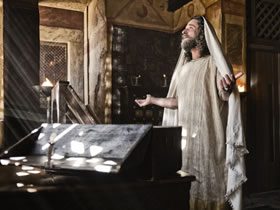Episode 5: Passion
From the remorse of Peter, through the crucifixion of Jesus and his subsequent resurrection to the zeal of his followers, we might think about the big themes of forgiveness and transformation which echo back to the beginning of the story.
Viewed as a holy book by a number of different religions, the Bible claims to provide spiritual guidance and direction
Peter denies knowing Jesus. What effect does this have on him, and on others?
Peter's denial, and subsequent restoration by Jesus, is a significant part of turning this self-sufficient fisherman into someone who can lead the church after Jesus' death and resurrection. Once again we see the theme of dependence on God as we seek to live in his world his way. This echoes back to the stories of Joshua, Samson and David.
- Peter insists that he will never deny Jesus (see Mark 14:29–31), and when he does so, he is devastated (see Mark 14:66-72), although he is the only one of the disciples to follow the arrested Jesus to the high priest's house:
-
- 'He began to call down curses, and he swore to them, "I don't know this man you're talking about."Immediately the rooster crowed the second time. Then Peter remembered the word Jesus had spoken to him: "Before the rooster crows twice you will disown me three times." And he broke down and wept.' (Mark 14:71–72)
- All the disciples are afraid and disillusioned after Jesus's arrest and crucifixion, but Jesus knows that Peter's failure will ultimately make him stronger, and able to strengthen the others:
-
- 'I have prayed for you, Simon, that your faith may not fail. And when you have turned back, strengthen your brothers.' (Luke 22:32)
Why does Jesus go willingly to the cross? What spiritual message does this communicate and how does it echo back through the previous stories?
Jesus knows that it is only through his death on the cross that sin can be decisively dealt with so that God can provide forgiveness and restoration to all who will receive it. This echoes right back to the story of Adam and Eve – as God seeks to restore us to the life he originally intended. To provide this, God gives his only son in a way that fulfils the promises given earlier in the Passover and the deliverance from slavery in Egypt.
- Jesus goes willingly to the cross because he knows that this is the only way by which human beings can be saved from their sin and rejection of God. In the Garden of Gethsemane, he prays:
-
- "My Father, if it is possible, may this cup be taken from me. Yet not as I will, but as you will." (Matthew 26:39)
- God's plan to save his people is anticipated right back in the garden of Eden, after Adam and Eve's initial rebellion, when he says to the Serpent:
-
- 'I will put enmity between you and the woman, and between your offspring and hers; he will crush your head, and you will strike his heel.' (Genesis 3:15)
- It is also foreshadowed by the rescue of Noah from the flood, and by the Passover and rescue from Egypt.
Jesus' followers do not believe that he has risen until they have seen the evidence for themselves. What principle does this convey?
Faith was never meant to be a blind leap. Faith is putting your trust in God because of, rather than despite the evidence.
- Thomas is known for his doubting of the other disciples' report that Jesus has risen from the dead, and he insists that he needs to see and even touch the nail marks for himself before he can believe it (see John 20:24–25).
- Jesus appears to the disciples again, when Thomas is with them, and invites him to check the evidence for himself:
-
- '"Put your finger here; see my hands. Reach out your hand and put it into my side. Stop doubting and believe." Thomas said to him, "My Lord and my God!" Then Jesus told him, "Because you have seen me, you have believed; blessed are those who have not seen and yet have believed."' (John 20:27–29)
- Luke says that he based his account of Jesus's life on eyewitness accounts (see Luke 1:1–4), and John insists that his message is based on what he experienced first-hand (see 1 John 1:1–3).
- In the Old Testament, God was also often (though not always) prepared to accommodate himself to those who needed evidence. In one notable example, Elijah throws down a challenge to the prophets of Baal: two bulls were prepared for sacrifice on altars and the true God would be known by his ability to send fire to burn up the sacrifice:
-
- At the time of sacrifice, the prophet Elijah stepped forward and prayed: "Lord, the God of Abraham, Isaac and Israel, let it be known today that you are God in Israel and that I am your servant and have done all these things at your command. Answer me, Lord, answer me, so these people will know that you, Lord, are God, and that you are turning their hearts back again." Then the fire of the Lord fell and burned up the sacrifice, the wood, the stones and the soil, and also licked up the water in the trench. When all the people saw this, they fell prostrate and cried, "The Lord – he is God! The Lord – he is God!" (1 Kings 18:36–39)
What transforms Jesus' followers from fearful failures into people with a vision to change the world? What opportunity does this offer?
After Jesus' ascension to heaven, his followers see more clearly how his death and resurrection were the fulfilment of God's plan to offer forgiveness and transformation to everyone who will receive it. But it is only as God sends the Holy Spirit that they receive the power to spread this message throughout the world.
- After the crucifixion, the disciples feel that all their hopes have been crushed (see Luke 24:21). They are overjoyed at his resurrection, but remain directionless until they receive the Holy Spirit about seven weeks later on the day of Pentecost.
- By this point, Jesus has forgiven and restored Peter after his denial (see John 21:15–19), but the Holy Spirit transforms him into a passionate preacher:
-
- "God has raised this Jesus to life, and we are all witnesses of it. Exalted to the right hand of God, he has received from the Father the promised Holy Spirit and has poured out what you now see and hear. . . . Therefore let all Israel be assured of this: God has made this Jesus, whom you crucified, both Lord and Messiah." (Acts 2:32–36)
- Peter recognises that this is a fulfilment of the prophecy of Joel in the Old Testament:
-
- 'I will pour out my Spirit on all people. Your sons and daughters will prophesy, your old men will dream dreams, your young men will see visions. Even on my servants, both men and women, I will pour out my Spirit in those days.' (Joel 2:28–29)
Paul's life is transformed by meeting Jesus and he then takes a leading role in the early church. What spiritual message does this convey, and how does this develop the themes from the previous stories?
God's forgiveness and transforming power is available for all who will receive it. Throughout the Bible, we have seen how the big theme of sin, judgement and grace comes down to individuals who are offered transformation and a new purpose for life – no matter who they are or what they have done.
- As with so many other key characters in the Bible, Paul is not chosen because of his goodness or holiness, but is rescued solely on the basis of grace:
-
- 'Even though I was once a blasphemer and a persecutor and a violent man, I was shown mercy because I acted in ignorance and unbelief. The grace of our Lord was poured out on me abundantly, along with the faith and love that are in Christ Jesus. Here is a trustworthy saying that deserves full acceptance: Christ Jesus came into the world to save sinners – of whom I am the worst. But for that very reason I was shown mercy so that in me, the worst of sinners, Christ Jesus might display his immense patience as an example for those who would believe in him and receive eternal life.' (1 Timothy 1:13–16)
- Noah, Abraham, Joseph, Moses, Rahab and David were all sinful people, but they believed God's promises to them, they trusted him, and he rescued them and worked through them, just as he later does with Paul. Isaiah summarises the need to have faith in God alone:
-
- 'You will keep in perfect peace those whose minds are steadfast, because they trust in you.Trust in the Lord forever, for the Lord, the Lord himself, is the Rock eternal.' (Isaiah26:3–4)






